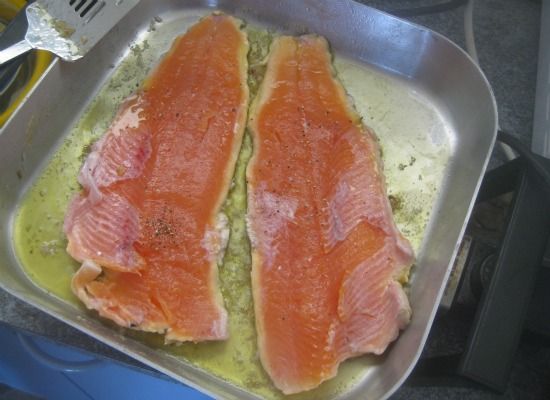Catch and Release: A Wicked Game?
Fishing is an effective means of bringing people to the water’s edge o admire the ecosystem and consider the value in preserving it
/https://tf-cmsv2-smithsonianmag-media.s3.amazonaws.com/filer/20120119022050AndrewBigBrownSMALL.jpg)
We stomped through a boggy marsh on the shores of a small pond near Greymouth, in New Zealand’s West Coast region. This flat plain resembled a patchy blend of tundra, taiga and tropical savannah, backdropped by huge mountain slopes of steaming jungles and glaciers. I was barefooted, plunging through the mud puddles and manure, and Andrew stepped first over a rope fence strung across the road between two posts. I followed, and zzuuhhh-WHUMP! A severe jolt blasted through my body. I froze, felt myself lift in slow motion as the world around me went silent. The gray-green landscape turned an alien orange in a seemingly psychedelic out-of-body experience. Then I screamed and cartwheeled onto my back, landing in a mud puddle. Andrew rushed over as we both realized what had happened. I had learned the lesson that every sheep, cow and goat here learns young: Electric fences hurt. Almost incredibly, these live-wire barriers—which crisscross New Zealand—are almost never marked, and, like any good sheep here, I jump back now at the sight of any wire fence.
Meanwhile, we have finally had some consistent luck with the big brown trout. From the mud banks of the winding streams we can see them hunkering on the bottom, and so long as we keep our shadows onshore, they aren’t shy about dashing to the surface and attacking flies dropped upon them. Andrew and I spent an hour the other day with our poles doubled over, fish after fish sprinting upstream and down, thrashing at the surface and finally rolling over.
We are torn between keeping some to eat and letting them go. Catching and releasing is an honored way of life for many trout fishermen, who revere their favorite fish as something sacred. Without doubt, fishing is an effective means of bringing people to the water’s edge, their eyes open and hearts thumping, to admire the ecosystem and consider the value in preserving it. But at its worst, catch-and-release fly fishing becomes a wicked game of torment. The angler calls it a “sport” to fool a fish into inhaling a sinister steel hook. He or she whoops and hollers as the frightened fish panics, and, after a fight, lands it on the bank, takes measurements for bragging purposes, imagines there is negligible risk that the fish will die of injuries, lets it go and comes back as soon as possible to do it again. I have known noble old fishermen who smoke tobacco pipes while casting, and I would be surprised if there weren’t others who read lines from Walden on the bank between trout. I love fish, fishing and fishermen—often the most active of conservationists—but our hobby often smells of rank and prestige.
The antithesis to all this may be to visit the water, pull out a fish and go home for dinner. In other words, keeping it real. I often prefer that route—and we’ve found that brown trout fillets simmered in olive oil, or whole rainbows broiled in the oven, do just dandy with a New Zealand Pinot Noir carefully chosen from the bottom shelf at the supermarket.

Our latest day of fishing was the grandest; in a series of shallow ponds miles from the highway, we saw absurdly big trout cruising the shores, and a dry fly set quietly upon their noses seemed just the item they were hungry for. We met just one other fisherman on the bank.
“In California, we’ve grown up catching 10-inch fish,” I said to the man. “Where are the little trout here?”
“These are the little ones,” he answered with a slanted smile.
We’ve come over Arthur’s Pass. The rest of the party drove while I rode my bicycle to keep my legs in working order. We’d eaten trout and quinoa for breakfast, but I was running on empty after 30 miles. I stopped at Jackson’s Tavern, locally know for its game pies, to inquire about buying fruit. “I only have two dollars,” I said sheepishly. The lady of the place slugged me lightly in the shoulder for offering money and pushed four oranges at me.
I pulled myself up the 18-percent grades near the top—and here, at 3,025 feet (don’t smirk; that’s about the highest pass they’ve got here) I encountered one of the nation’s most celebrated wild creatures: the kea. This endangered parrot is so clever and mischievous that locals can’t decide whether to love the birds or hate them. Keas will tear windshield wipers from cars, shred unguarded clothing and backpacks and raid cabins. I have also heard reports that keas will lock or unlock doors, depending on which action most inconveniences the nearest person. I even heard tell of a woman who got locked from the outside into an outhouse by the parrots. The birds are even said to be deft at unscrewing bolts, and I’m sure they have no trouble with Allen heads.

We’re going trout fishing for perhaps the last time today, as we’re headed this afternoon for the East Coast—and we’re taking our credit cards and passports with us, in case some team of keas should break into our room with plans to make off with our identities.
/https://tf-cmsv2-smithsonianmag-media.s3.amazonaws.com/accounts/headshot/Off-Road-alastair-bland-240.jpg)
/https://tf-cmsv2-smithsonianmag-media.s3.amazonaws.com/accounts/headshot/Off-Road-alastair-bland-240.jpg)